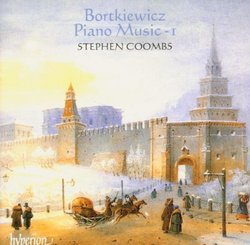| All Artists: Bortkiewicz, Coombs Title: Piano Music 1 Members Wishing: 0 Total Copies: 0 Label: Hyperion UK Original Release Date: 1/1/2000 Re-Release Date: 7/8/1997 Album Type: Import Genre: Classical Style: Number of Discs: 1 SwapaCD Credits: 1 UPC: 034571169330 |
Search - Bortkiewicz, Coombs :: Piano Music 1
 | Bortkiewicz, Coombs Piano Music 1 Genre: Classical
|
Larger Image |
CD Details |
CD ReviewsEnjoyable Russian Romanticism V. Wilson | Cambridge, MA United States | 02/16/2000 (4 out of 5 stars) "If you like Rachmaninoff, you'll love this disk of character pieces by the little-known Sergei Bortkiewicz. This is the type of music that Vladamir Horowitz used to program on his concerts--ear catching melodies, lush harmonies and textures--all of which is out of style in the modern concert hall. Too bad.Coombs plays this music to the hilt and is given terrific sound by Hyperion. Perhaps 80 minutes of it is too much for one sitting, but pick one of the sets on this disk and listen to it and remember a time when virtuosos liked to dazzle their audiences with melody and technique rather than always trying to make a BIG statement.PS. If you like this, get Bortkiewicz's Piano Concerto No. 1 on Hyperion. It's the type of piece that would make going to the concert hall fun (and fun IS a meaningful experience!)" Passionate, Poetic, Characteristic set of Piano Works! David A. Hollingsworth | Washington, DC USA | 03/11/2001 (5 out of 5 stars) "After giving high praises of Bortkiewicz' Piano works of Volume II, his piano music of Volume I are marginally more enticing, evocative, and even personal. The Lamentations and Consolations (in Books I & II) of 1916 are remarkably rich in its thematic invention and with memorable, late-romantic rhetoric, in the manner of Liszt, Tchaikovsky, Rubinstein, Glazunov,& Rachmaninov. For examples, the Lamentation in D minor is noble and graceful, like autumn leaves falling gracefully to the ground, that even Rubinstein would love to claim as his own. The Consolation in D major has the Glazunovian majesty mix in with charmingly innocence and sparkle. Somehow, Wagner enters my mind whenever I hear #3 of book I (Lamentation in C sharp minor) while #7 of book II (Lamentation in E-flat minor) is urgent and piquant, somewhat with a French tone that amazingly anticipates Poulenc's Concerto for Piano Duet & orchestra.Bortkiewicz' "From Andersen's Fairy Tales" is a set of twelve piano pieces that serve as musical treatments of Andersen's stories. The set is characteristic and narrative in nature, with the musical portrait for each of the stories vivid and colorful. Bortkiewicz' melodic invention remained strong, though perhaps the writing is not as personal as the Lamentations and Consolations. Nevertheless, each of the pieces are euphoniously attractive in their own way, especially the "Princess and the Pea" and "The Nightingale", while you may sense something of a comedy in "The Ugly Duckling" and "The Hardy Tin Soldier."To my mind, the stronger and more purposeful, though not as individual as the other two on this disc are the Ten Preludes op.33 (1926). The First, in C sharp minor is dark and powerful, in the vein of Rachmaninov while the brighter Second Prelude in F sharp major somewhat modelled on the piano works of Chopin and Balakirev. The Third, in D major, is innocent and sparkling, in the spirit of Glazunov (in his glittering set of waltzes) while Scriabin looms rather large in the Fourth, in B minor. Some compensation was made in the Sixth, Seventh, & Eighth Preludes, however, with Bortkiewicz' personality shining through like a sun over the lily fields, where beauty and its essence are so much alive and breathing. Stephen Coombs, whose sleeve notes are immensely detailed and exemplary, rendered the piano music with warmth, passion, and imagination, never ran the risk of blandness and over-emphasis. The recording is of high standards, typical of Hyperion."
|

 Track Listings (30) - Disc #1
Track Listings (30) - Disc #1